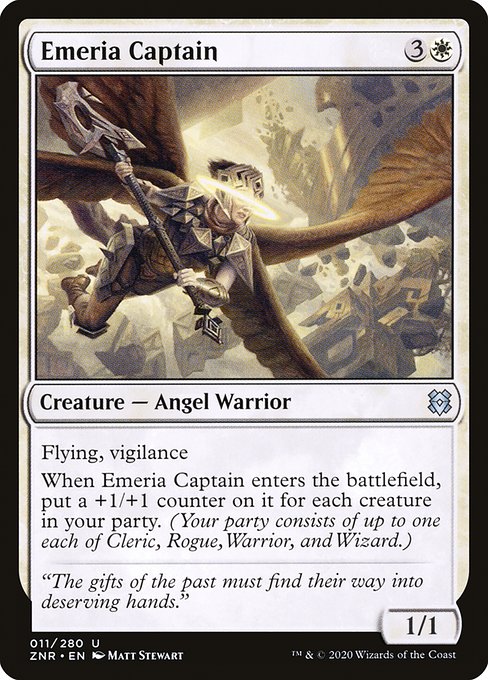standard
future
historic
gladiator
pioneer
explorer
modern
legacy
pauper
vintage
penny
commander
brawl
alchemy
paupercommander
duel
oldschool
premodern
Rulings
If a creature has more than one party creature type, and there are multiple ways to count that creature that could result in a different number of creatures in your party, the highest such number is used. For example, if you control a Cleric and a Cleric Wizard, the number of creatures in your party is two. You can’t choose to have it be just one by counting the Cleric Wizard first as a Cleric.
Because Emeria Captain receives its +1/+1 counters from a triggered ability rather than a replacement effect, players may take actions while that triggered ability is on the stack and Emeria Captain’s toughness is just 1.
To determine “the number of creatures in your party,” check whether you control a Cleric, whether you control a Rogue, whether you control a Warrior, and whether you control a Wizard. The number is the total number of those checks to which you answered yes. Each creature you control can be counted for only one of those checks.
If an ability of a creature counts the number of creatures in your party, that number is counted as the ability resolves. If that creature is still on the battlefield when the ability resolves, it’ll be counted if appropriate.
An ability referring to the number of creatures in your party gets a number from zero to four. Such abilities never ask which creatures are in your party, and you never have to designate specific creatures as being in your party. You can’t choose to exclude creatures from this count to lower the number.
Because Emeria Captain receives its +1/+1 counters from a triggered ability rather than a replacement effect, players may take actions while that triggered ability is on the stack and Emeria Captain’s toughness is just 1.
To determine “the number of creatures in your party,” check whether you control a Cleric, whether you control a Rogue, whether you control a Warrior, and whether you control a Wizard. The number is the total number of those checks to which you answered yes. Each creature you control can be counted for only one of those checks.
If an ability of a creature counts the number of creatures in your party, that number is counted as the ability resolves. If that creature is still on the battlefield when the ability resolves, it’ll be counted if appropriate.
An ability referring to the number of creatures in your party gets a number from zero to four. Such abilities never ask which creatures are in your party, and you never have to designate specific creatures as being in your party. You can’t choose to exclude creatures from this count to lower the number.
Rulings
If a creature has more than one party creature type, and there are multiple ways to count that creature that could result in a different number of creatures in your party, the highest such number is used. For example, if you control a Cleric and a Cleric Wizard, the number of creatures in your party is two. You can’t choose to have it be just one by counting the Cleric Wizard first as a Cleric.
Because Emeria Captain receives its +1/+1 counters from a triggered ability rather than a replacement effect, players may take actions while that triggered ability is on the stack and Emeria Captain’s toughness is just 1.
To determine “the number of creatures in your party,” check whether you control a Cleric, whether you control a Rogue, whether you control a Warrior, and whether you control a Wizard. The number is the total number of those checks to which you answered yes. Each creature you control can be counted for only one of those checks.
If an ability of a creature counts the number of creatures in your party, that number is counted as the ability resolves. If that creature is still on the battlefield when the ability resolves, it’ll be counted if appropriate.
An ability referring to the number of creatures in your party gets a number from zero to four. Such abilities never ask which creatures are in your party, and you never have to designate specific creatures as being in your party. You can’t choose to exclude creatures from this count to lower the number.
Because Emeria Captain receives its +1/+1 counters from a triggered ability rather than a replacement effect, players may take actions while that triggered ability is on the stack and Emeria Captain’s toughness is just 1.
To determine “the number of creatures in your party,” check whether you control a Cleric, whether you control a Rogue, whether you control a Warrior, and whether you control a Wizard. The number is the total number of those checks to which you answered yes. Each creature you control can be counted for only one of those checks.
If an ability of a creature counts the number of creatures in your party, that number is counted as the ability resolves. If that creature is still on the battlefield when the ability resolves, it’ll be counted if appropriate.
An ability referring to the number of creatures in your party gets a number from zero to four. Such abilities never ask which creatures are in your party, and you never have to designate specific creatures as being in your party. You can’t choose to exclude creatures from this count to lower the number.
Your collection? Your decks?
Want to manage your collection and/or create decks?


 0
0
 0.18€
0.18€